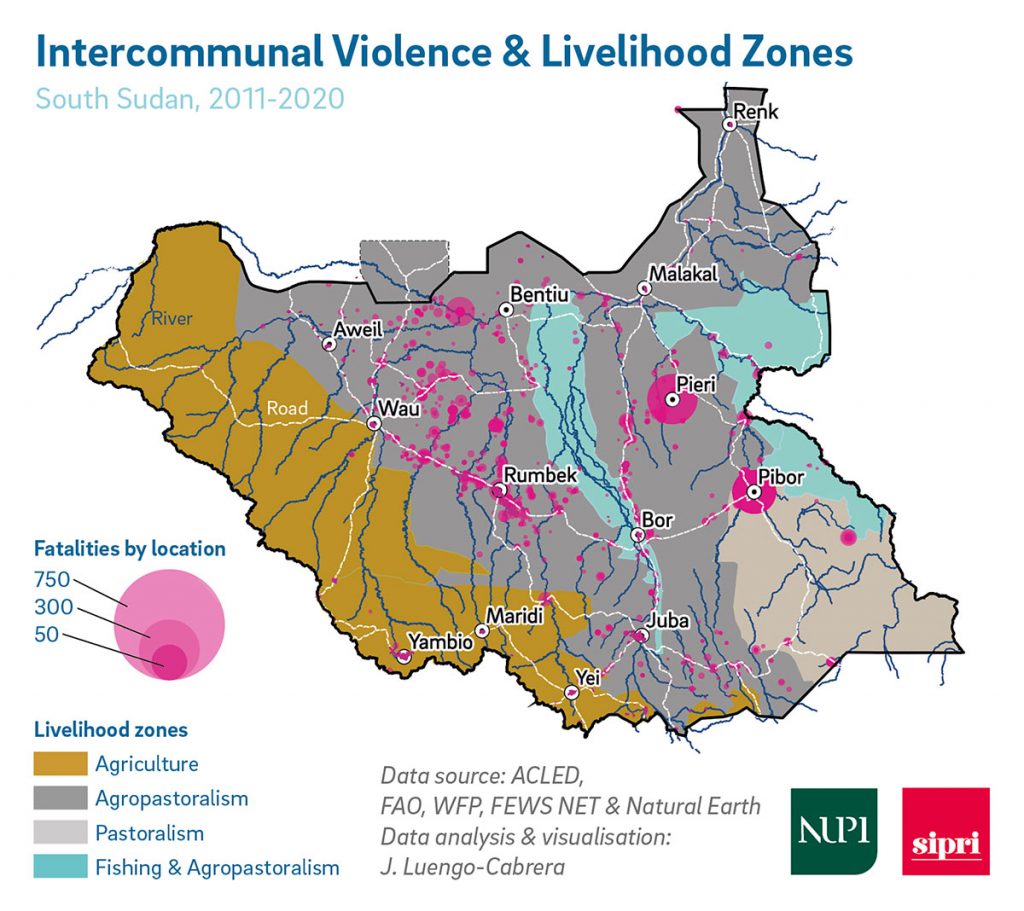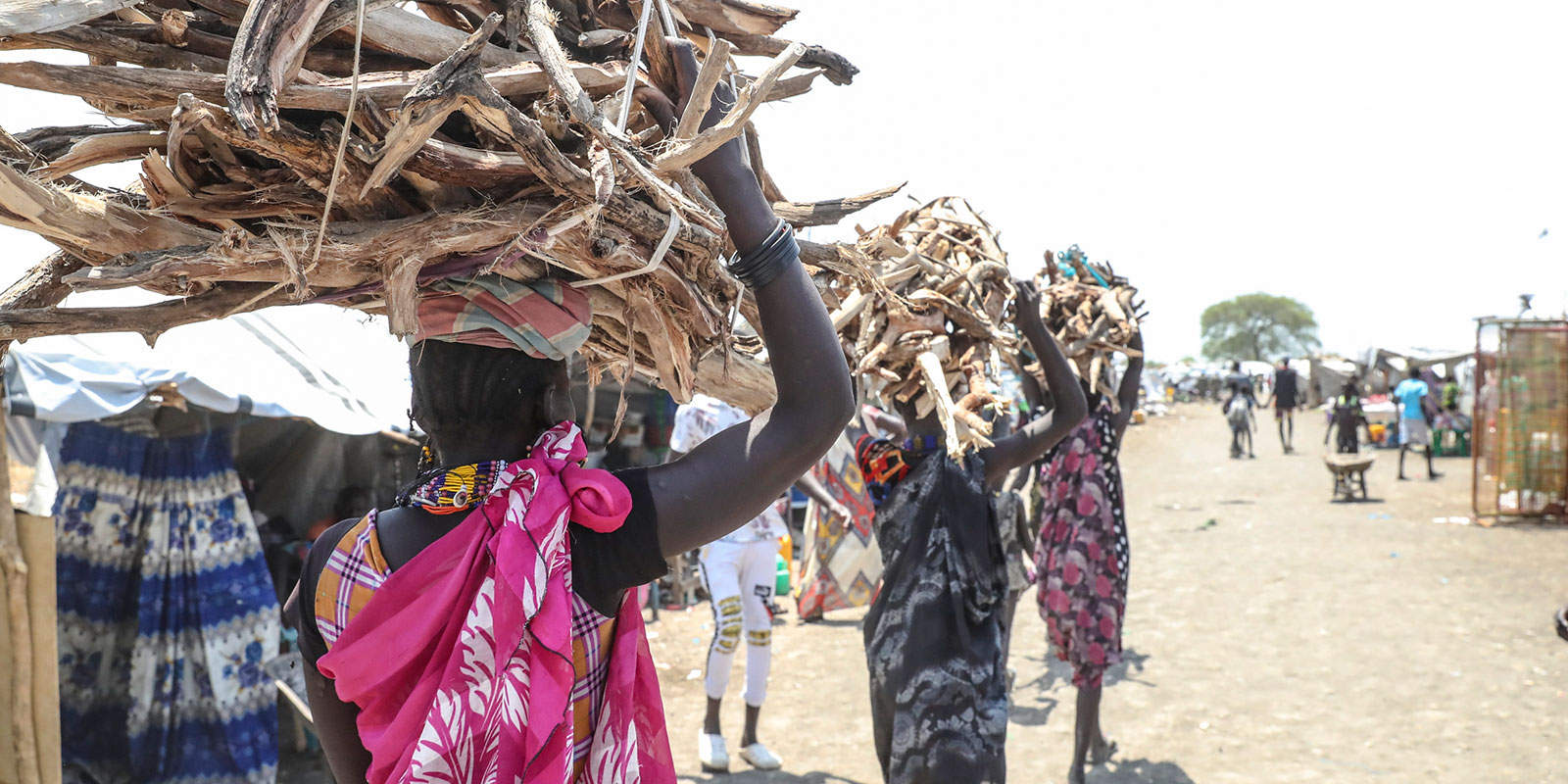The long-term effects of climate change (like aridification) and short-term impacts of climate variability (floods and droughts) can disrupt livelihoods, food security and increase the risk of displacement and violence. Mean annual temperatures across South Sudan have increased by more than 0.4°C every decade in the past 30 years and are projected to increase between 1°C and 1.5°C by 2060, creating a warmer and drier climate. In the north-east, rainfall has decreased by 15–20%, but other regions experienced more frequent and severe floods. In 2020, more than 700,000 people were affected by severe flooding in the Jonglei and Eastern Nile states, which destroyed crops and displaced almost 85,000 people in Jonglei. Such large-scale displacement places a huge strain on the people uprooted, but also on host communities. Floods in Jonglei, Eastern Lakes and Terekka in 2020 forced migrant herders to seek new livestock routes, leading many to the Equatoria regions which created tensions with host populations. In its 2021 Humanitarian Needs Overview, the United Nations Office for the Coordination of Humanitarian Affairs (UN OCHA) noted that violent conflict, flooding and the COVID-19 pandemic have strained already-limited access to essential services, including health facilities, in South Sudan.
The new @unmissmedia mandate recognises the adverse effects of climate change on #SouthSudan and emphasises the need for the Government and UN to undertake #climatesecurity risk assessments
Tweet
In South Sudan, 95% of livelihoods depend on traditional rainfed agriculture, crop farming, pastoralism and animal husbandry. Climate shocks, like droughts and floods, have affected livelihoods and food security creating resource scarcities and increasing competition between communities, including pastoralists and farmers.

The negative impacts of COVID-19 on food insecurity could threaten peace and security, with recent reports suggesting that the impacts of COVID-19 have also undermined livelihood and food security in South Sudan. The Food and Agriculture Organisation of the United Nations (FAO), highlighted that interruptions in trade and transport —because of COVID-19 restrictions and the conflict — have disrupted food availability, particularly in cross-border areas, and increased food prices.
Climate change in South Sudan can affect men and women in different ways — an estimated 87% of female heads of household have no formal education, compared to 65.7% of male counterparts. Traditional roles for men and boys include livestock herding and migration, while women and girls are exposed to climate impacts because of the high dependency on natural resources and prevailing gender inequalities. UN Women finds that the effect of COVID-19 restrictions have particularly impacted female-run small businesses in the informal sector, requiring support for women to find alternative sources of income. But transformations, including peace processes and climate adaptation, can create opportunities for new gender roles to emerge, for example, through gender-inclusive policy decisions to address the disproportionate impact of climate change on women and girls.
In some cases, local climate stress can feed national political instability and conflicts. In others, armed conflict reduces people’s resilience to climate shocks. UNMISS reported 415 violent incidents between communities from January and May 2020, and data from 2019 also showed escalating violence among the Dinka, Nuer and Murle communities in Jonglei. FAO has warned that South Sudan lacks effective state institutions and local mechanisms for the peaceful settlement of resource conflicts, in part because of the long-standing conflict. These factors weaken communities’ resilience and adaptation options when confronted with the adverse effects of climate change.
Political leaders and elites have accumulated wealth from cattle, making many complicit in cattle-related conflicts and resource exploitation. But the combination of climate stress, raiding practices and civil war have inflated livestock prices to the extent that they negatively impact ordinary people, especially herders. This disparity is indicative of the unequal impacts of climate change, which could feed grievances towards elite groups.
Across parts of South Sudan, deforestation, illegal timber exports and charcoal production by civilians and armed groups impact climate change. For example, soldiers from the South Sudan People’s Defence Forces (SSPDF) reportedly supplement small salaries with profits from unregulated charcoal production in the Equatoria regions.
The United Nations Mission in South Sudan’s (UNMISS) mandate was renewed on 12 March 2021, and the inclusion of climate change was a key issue of contention among members of the United Nations Security Council. The final outcome, resolution 2567 (2021), does recognise the adverse effects of climate change, ecological changes and natural disasters on the country’s humanitarian situation and stability and also emphasises the need for the Government and UN to undertake risk assessments and risk management strategies in relevant programming.
Given the converging effects of climate change and security in South Sudan and the recommendations from the United Nations Security Council, UNMISS can boost its responses to climate, peace and security risks in South Sudan by:
- Supporting the Government in establishing an early warning and emergency response centre, managed by the Government in conjunction with research institutions and experts in South Sudan, with an emphasis on women’s participation in developing conflict-sensitive climate adaptation and climate-related security risk strategies.
- Enhancing its climate-related security risks analysis and reporting on how climate security issues affect its mandate, with particular attention on the impacts of climate security on women, girls and female-headed households.
- Investing in personnel capacity-building in joint risk assessments, integrated analysis and planning, the gendered effects of climate stress, and preventing and resolving communal and transhumance-related conflict, particularly for the Civil Affairs Division working on local conflict management and peacebuilding.
Dr. Andrew E. Yaw Tchie (NUPI) and Kheira Tarif (SIPRI) both support a collaborative project undertaken by NUPI and SIPRI to generate evidence-based information on a select number of countries on the UN Security Council agenda. The Climate Change, Peace and Security Fact Sheet on South Sudan is available here.



